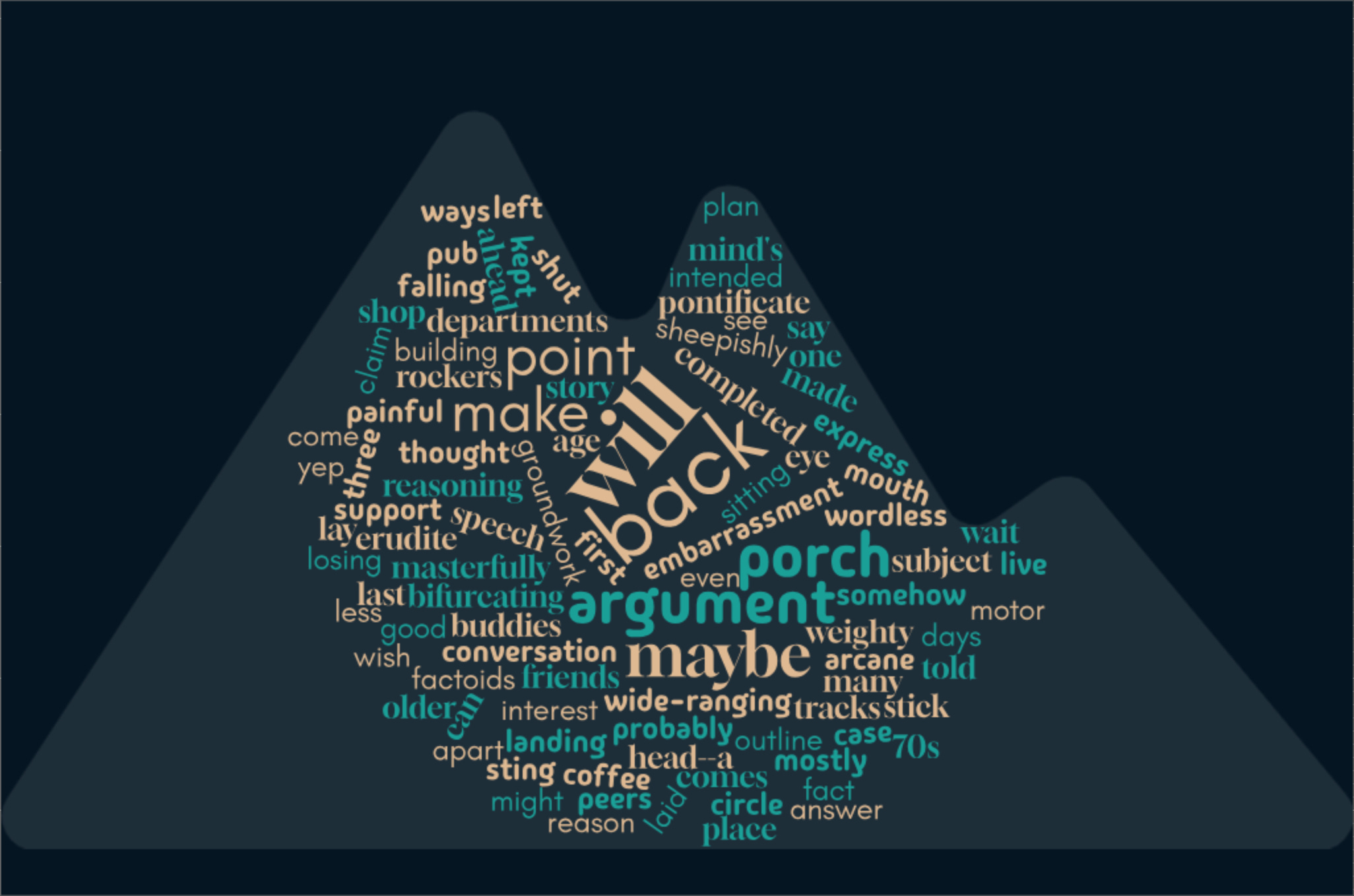
How Our Words Make Sense (or Not)
Raise your hand if you know what I’m talking about here:
You are in a wide-ranging conversation with one or more friends sitting in the rockers on the back porch (the good ol’ days, yep). You expound on some weighty arcane subject of interest.
You lay the groundwork for your argument to stick the landing. But then at last, when you come back to the intended intent or claim your erudite factoids were laid out to support, The Point has left the building.
“I told that story for a reason. I’ll circle back. Wait for it.” I say sheepishly with some embarrassment, the sting made less painful by the fact that my buddies (mostly age peers in their 70s or older) have been there before, and will be again, maybe even before we leave the porch (or the pub or coffee shop.) But hey. Really: Are we losing it?
And the answer is: Maybe. But probably not, if this is all you have falling apart in the motor speech and reasoning departments. (I will tell you about a couple of other derailments in a near-future post.) There are many ways that what comes out of your mouth might make you wish you’d kept it shut in the first place.
WHAT’S THE MATTER WITH ME?
The language-logic pitfall for me is just simply failing to keep the destination of my talking points in mind until the intended conclusion.
In my own defense, while suffering some mild frustration and embarrassment while lost in the weeds, I do more often than not come round to complete the circle.
I am determined to not let myself off the hook, and sometimes it is long after my conversation partners have left the building that I have the AHA! of connecting the dots as I had intended. And I am convinced that there are skills to be built leading more reliably to the RECOVERY of the purpose of my points.
But (before I lose focus here and start talking about lichens or tardigrades ) my point is: I think, even at this late-ish stage in life, we can become more intentional in the process of ATTENTION-AWARENESS early in the conversation and complete the loop more often.
Success in this area will also help with the “why did I come in here after all?” when you stand there, foolishly vacant of your intended purpose.
From decades of use of memory methods, I do a decent job of keeping up with THINGS, often by creating an exaggerated story about them. That’s a common tactic and it works.
“See me putting the car title into the glove box. The document is printed on a enormous model of the car that is flame orange.” Silly but helpful.
But I am less disciplined to turn my focus and attention on ideas or thoughts I don’t want to lose before I use them to make a point. Idea visualization and thought construction while speaking might also benefit from memory discipline.
I’ll let you know how it goes. Or just ask my friends. The won’t hesitate to tell on me. If they can remember.
NOTE: As a mercy to readers, I divided this topic in two. I’ll have more related comments on the topic on Sunday—in an unheard-of two posts in a single week.

Often, in struggling to bring the word to mind, you are able to pull up the letter it starts with and that the forgotten was purple and used in the kitchen. But bummer: not the word itself. You’re so close, but there is sits on the tip, unable to be spoken because the complete memory package for that word has temporarily failed to load.
Yep, boomers, you’re older than dirt. But you’ll be fine. Given enough time. If you have it.
While the older adults experienced lethologica more often, the percentage of resolved instances (meaning the word was eventually found) was equal across all three [age groups]. “Given enough time, even the oldest participants resolved virtually all TOT experiences,” the study authors wrote. link
(247) How Words Get Stuck on the Tip of Your Tongue – YouTube
► THOUGHT BLOCKING
You are in the middle of a sentence that will be part of an intended paragraph so you can finish the thought. But the next sentence just disappears. (This is different from not making your point that I confessed to in the last post. )
Ruling out the possible pathological conditions that can make this occur, a sudden distraction can make that intended paragraph scamper off into the weeds.
Surprise, startle and stop: Research shows that the “stop dead in your tracks” effect of a sudden loud noise or other sudden interruption that stops your body motion also clears your cognitive chalkboard of all your careful notes.
“For now, we’ve shown that unexpected, or surprising, events recruit the same brain system we use to actively stop our actions, which, in turn, appears to influence the degree to which such surprising events affect our ongoing trains of thought.”
… “The radically new idea is that just as the brain’s stopping mechanism is involved in stopping what we’re doing with our bodies it might also be responsible for interrupting and flushing out our thoughts,” Wessel concluded. “It might also be potentially interesting to see if this system could be engaged deliberately—and actively used to interrupt intrusive thoughts or unwanted memories.”
Why do I stop talking mid-sentence? The Psychology Of Thought Blocking
HINT: Why, some have asked, am I up every day so crazy early? Because I cherish the two hours I spend alone without being forced to stop my thought process when my wife suddenly hollers from the kitchen to ask me to help her locate the missing (what is that purple thing we strain noodles in? Starts with a C.) And then it takes 15 minutes to circle back around to maybe recover a few fragments of the blocked thought.
The Neuroscience of Losing Your Train of Thought | Psychology Today
